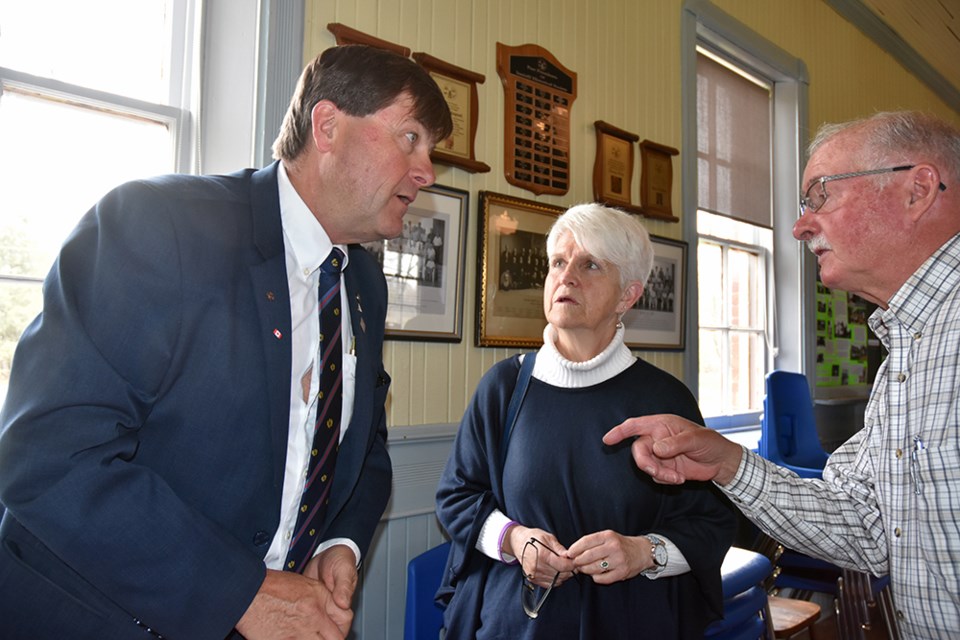Johnstone Mervin “Ty” Trotter saw action in Italy and the Netherlands during the Second World War. He was still overseas when the war came to an end in 1945.
It wasn’t until 1946 that Trotter was finally demobilized and transported back to North America, with thousands of other soldiers, aboard the Queen Mary.
And it wasn’t until 1949 that he and his new bride, Audrie Dempsey, moved to Gilford.
Back then, Gilford “was like coming to Saskatchewan,” said son John Trotter, who said it was more like homesteading than moving to a community less than an hour from Toronto.
There was no running water in their house when they moved in.
Ty opened Trotter’s garage and service station at Fennell’s Corners, at the intersection of then-Highway 11 and Highway 89, in the early 1950s.
When he was old enough, John worked alongside his dad, and eventually took over the business. Ty passed away in 1996, but Trotter’s Esso Station continued to be a landmark in the community.
John Trotter was guest speaker at the May meeting of the Innisfil Historical Society, held at the Knock Schoolhouse heritage site, sharing stories from his years in business – especially from the tow and emergency response side.
“I’ve seen a lot of cars on fire, in water, in ditches,” Trotter said. “Cars in trees. Cars in houses. Cars in huge drainage tunnels under (Highway) 400 that I didn’t know existed.”
Running a small business is difficult, but the towing sector is even harder.
It's “a tough, tough business to be in,” he said, citing horrendous crashes and the aftermath of collisions.
In 2009, Trotter's tow-truck operator, Carl Hordyk, was first on the scene of a collision on the 400. Within seconds, he attended a severely injured driver, providing first aid until paramedics arrived. He later received commendations from the OPP and St. John Ambulance for his life-saving efforts.
It hasn't been all heartbreak and hard work. Trotter shared other, more light-hearted moments – including the 1997 visit of a “full-sized mature Siberian tiger” named Kadesh, “acting like a big house cat. My mother was thrilled. She wanted to pet it.”
Then there was the customer who drove up on a bitterly cold day on Dec. 18, 2009 and paid at the pump, before coming inside to ask for a cup of coffee. The customer was “wearing a hat, wristwatch, running shoes, and nothing else.” The lone clerk persuaded the man to return to his vehicle, and brought him the coffee, figuring it was all part of a hazing.
“We have it all on full-colour multiple security camera,” Trotter said. “One day, we’re going to find out who it was.”
And back in 2014, there was an incident that made the Toronto newspapers. On Sept. 25, a young couple on their way to hospital in Richmond Hill pulled into the service station and, 14 minutes later, a very pregnant Beth Arsenault gave birth to 7 lb. 13 oz. Caleb.
The community sign outside the gas bar shared the news, as it has shared other community information over the years, from the latest performances at Cookstown’s South Simcoe Theatre, to local birthdays, anniversaries and weddings.
“This business has hosted many community events and fundraisers,” said Trotter, noting for years he hosted the Gilford Lions Club’s annual Victoria Day sale of fireworks. When the Lions started, there were no regulations; the trailer filled with fireworks was parked just across from the pumps.
By the time the Lions stopped selling fireworks, regulations had changed, requiring permits and more control over location.
It was a similar story when it came to firefighter training, held in the yard behind the station.
“For many years, we actually set cars on fire,” said Trotter. “It was bizarre.”
From charity motorcycle rides, to bringing “smashed cars to schools to impress on young people the importance of driving sober,” Trotter's Esso has played a role in the community.
By 2020, the company will have employed about 200 staffers who put in 1.4 million hours of work, pumped a quarter-million litres of fuel, and answered 150,000 tow calls, Trotter said.
“It isn’t easy to operate a small business, but it certainly is interesting,” he concluded. “I’ve seen everything.”



